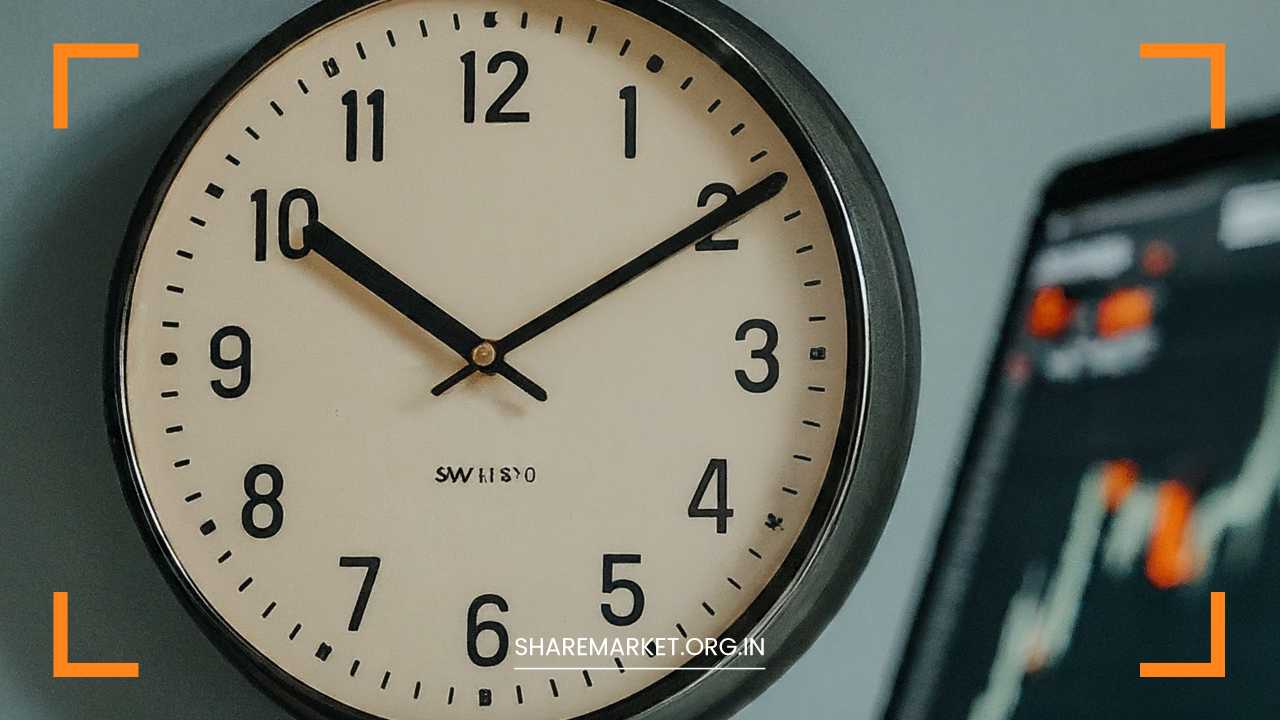When Share Market Open?

When Share Market Open
Stock Market Opening and Closing Times
In India, trading in the share market is limited to a specific time interval. Retail customers are required to conduct their transactions through a brokerage agency between 9.15 a.m. and 3.30 p.m. on weekdays.
The majority of investors engage in buying and selling securities listed on the two major stock exchanges in India: the Bombay Stock Exchange (BSE) and the National Stock Exchange (NSE).
It’s worth noting that the trading timings in the Indian share market are consistent across both these prominent stock exchanges.
The trading hours in the Indian stock market are divided into three segments:
Pre-opening Timing
The trading session in the Indian stock market begins at 9:00 a.m. and lasts until 9:15 a.m. During this time, investors can place orders to buy or sell securities. This session can be further categorized into three segments:
9.00 a.m. – 9.08 a.m.
During the opening time of the stock market in India, investors can place orders for any transaction. These orders are given priority when actual trading commences, and they are cleared off at the beginning of the session.
It is advantageous for investors as they have the flexibility to modify or cancel their requests during this time. However, it’s important to note that no orders can be placed after this 8-minute pre-opening session period.
9.08 a.m. – 9.12 a.m.
This segment of the Indian share market timing is crucial for determining the prices of securities.
The price matching order mechanism matches the demand and supply prices to facilitate accurate transactions between investors who wish to buy or sell a security.
The final prices at which trading will commence during the regular Indian stock market session are determined through a multilateral order matching system.
The price matching order process significantly influences the transaction price of securities during the normal session of Indian stock market timing.
It’s important to note that modifications to orders already placed are not available during this session, limiting the ability to make changes to existing orders.
9.12 a.m. – 9.15 a.m.
This period serves as a transitional phase between the pre-opening session and the normal Indian share market timing.
During this time, it is not possible to place additional orders for transactions. Furthermore, any existing orders placed between 9:08 a.m. and 9:12 a.m. cannot be revoked or canceled.
Normal Session
This is the main trading session of the Indian share market, which spans from 9:15 a.m. to 3:30 p.m.
During this period, transactions are conducted through a bilateral order matching system, where the price determination is based on the interplay of demand and supply forces.
The bilateral order matching system is known for its volatility, which leads to various market fluctuations that ultimately impact security prices.
To regulate this volatility, the multi-order system was introduced for the pre-opening session and incorporated into the Indian stock market timings.
Post-closing Session
The stock market in India closes at 3:30 p.m., and no further exchanges occur after this time. However, it is during this period that the closing price is determined, which holds significant influence on the opening security price for the following day.
The closing time of the stock market in India can be divided into two sessions:
3.30 p.m. – 3.40 p.m.
The calculation of the closing price in India involves taking a weighted average of the prices of securities traded between 3:00 p.m. and 3:30 p.m. on a stock exchange.
When determining the closing prices of benchmark and sector indices such as Nifty, Sensex, S&P Auto, and others, the weighted average prices of the listed securities are taken into account.
3.40 p.m. – 4 p.m.
This period occurs after the stock market has closed and allows for the placement of bids for the following day’s trading.
Bids placed during this time are confirmed if there are sufficient buyers and sellers in the market. These transactions are executed at a predetermined price, regardless of any changes in the opening market price.
As a result, investors who have already placed their bids can realize capital gains if the opening price exceeds the closing price. If the closing price exceeds the opening share price, bids can be canceled within the narrow window of 9:00 a.m. to 9:08 a.m.
The operating time of the stock market in India can be illustrated using the following table:
| Session | Time |
|---|---|
| Pre-opening session | 9:00 a.m. – 9:15 a.m. |
| Market opening session | 9:15 a.m. – 3:30 p.m. |
| Closing price determination | 3:30 p.m. |
| Post-closing session | 3:30 p.m. onwards |
Please note that the timings provided are subject to change and it’s advisable to refer to the official sources for the most accurate and up-to-date information.
Aftermarket Orders
Following this time frame, no transactions can occur in the stock market. However, investors have the option to place aftermarket orders for securities of selected companies.
These orders will be allocated at the opening market price on the following day.
‘Muhurat’ Trading
In general, the Indian stock market remains closed for transactions during Diwali, which is a widely celebrated religious festival across the country.
However, on the occasion of Diwali each year, the market opens for a one-hour trading session. This year, on November 12, 2023, a one-hour trading session will be held from 6:15 p.m. to 7:15 p.m.
This specific timing is considered auspicious for trading during Diwali.

















